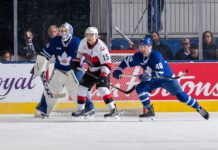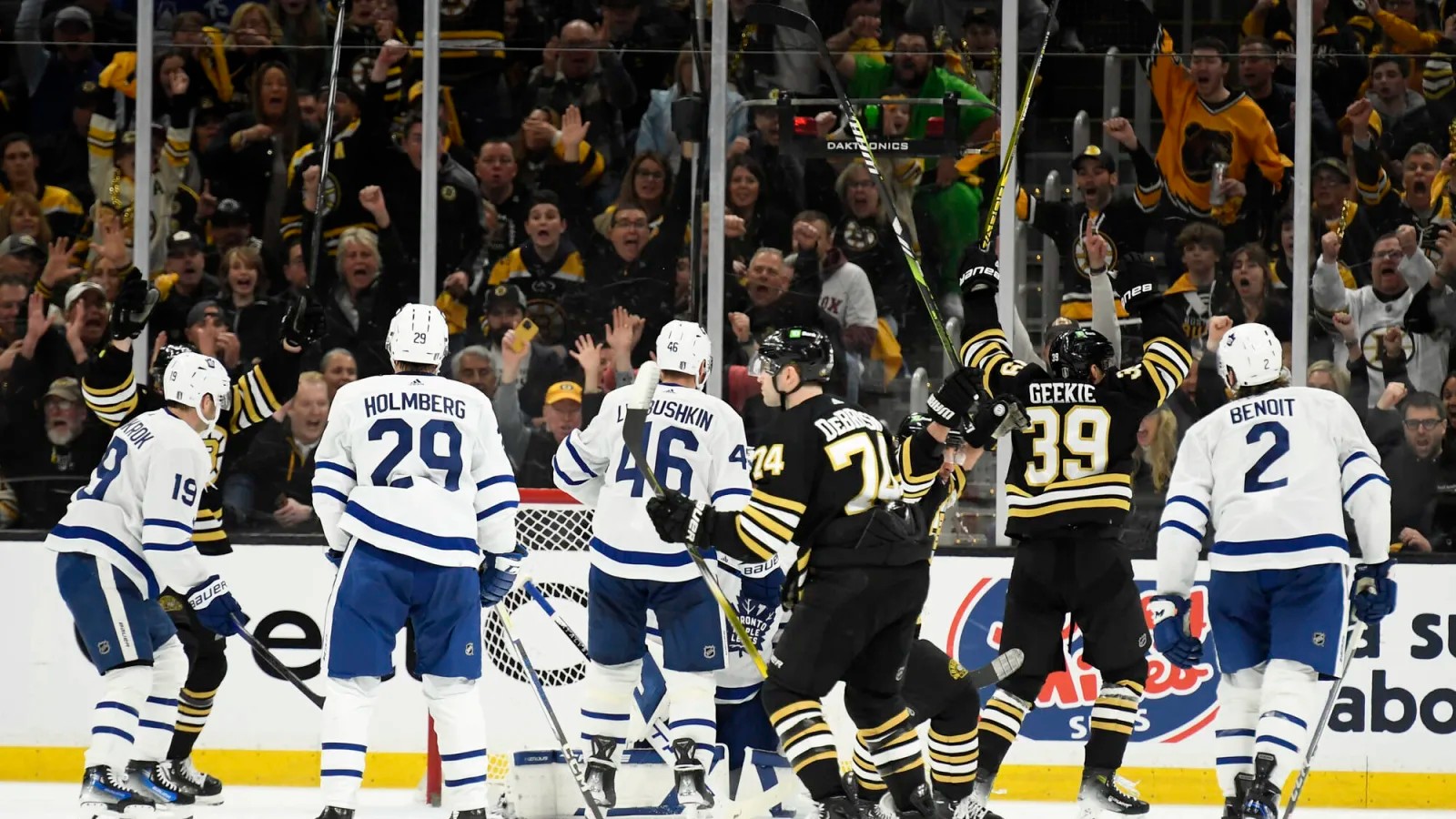For the second straight year, the Toronto Maple Leafs opened the first round of the playoffs with a near-worst-case scenario.
The Leafs allowed the first goal on the first shot against and continued to make sloppy mistakes all night. After the Leafs nearly tied the game early in the second period, the Bruins were able to take a 2-0 lead and then capitalized on the parade of Toronto miscues to strike multiple times on the power play. It was 4-0 by the end of the second period, and a brief Leafs surge in the early third was not enough to make this a competitive game again.
A lot went wrong in this game: ill-discipline, a dreadful penalty kill, an impotent power play, puck management problems, second-best goaltending, and an inability to finish offensive chances. In so many ways, it was a distillation of every problem this era of the Maple Leafs have had in the playoffs. Now the Leafs have one day to figure out how to find some traction and flip the script before Game 2.
Turning Points
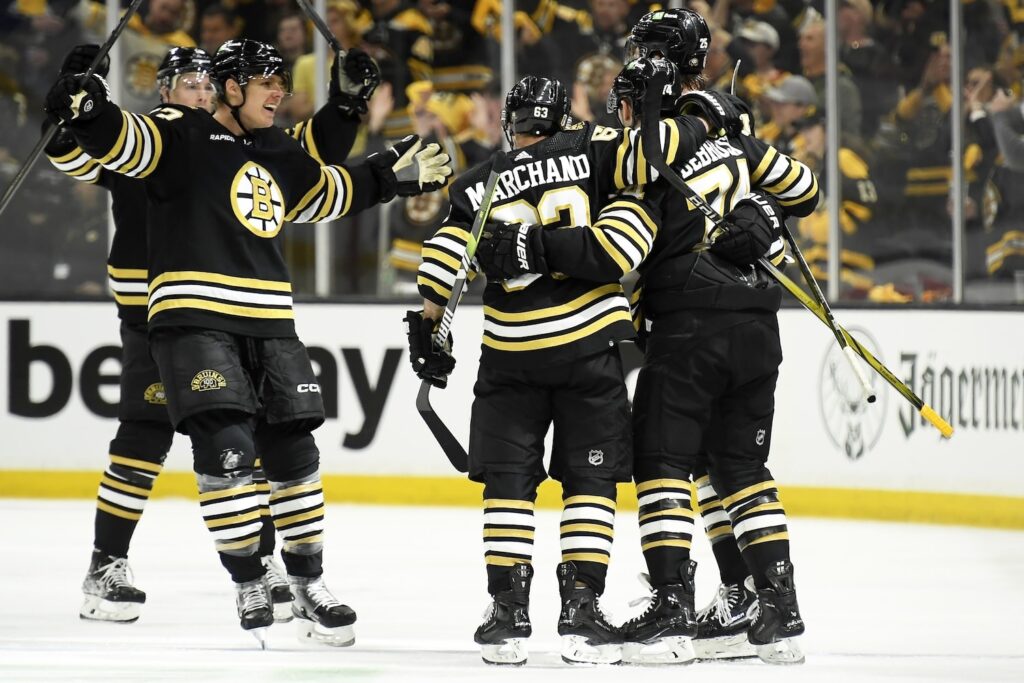
There were two big turning points in this game, both of which were instances when the Leafs had an opportunity to score, didn’t capitalize, and immediately conceded a goal to Boston.
The first was right off the hop in the opening couple of minutes of the game. The Leafs looked decent to begin the game with a few lively shifts (one from the second line, in particular) and created a Grade-A scoring chance for Nick Robertson. When Jake McCabe took a shot that whistled wide of the net, Pontus Holmberg retrieved the loose puck and saw all five Bruins down low around the net, promptly going low-to-high in response. He gave it back to McCabe, whose shot this time forced a rebound out of Jeremy Swayman right to Robertson.
Robertson spotted the loose puck and immediately pounced, putting a turn-around shot on net from point-blank range. Swayman flashed the pad, and an audible gasp of relief could be heard in the TD Garden. The Bruins were off the hook, but as the Leafs’ third line exited the ice just two minutes into the game, shots were 4-0 for Toronto. The Leafs were in the game, competing, winning the territorial battle, and feeling good.
And then came the fourth line’s first shift. The Connor Dewar dump-in was quickly dug out and went back up the wall the other way. Joel Edmundson hard pinched and Ryan Reaves did not support his defenseman, instead finishing a check on Patrick Maroon. It allowed the Bruins to break out with possession for a 2-on-1, where Timothy Liljegren went down a little early and didn’t force the shot against a depth forward, allowing Jesper Boqvist to loft a pass with ease over the defender. The feed landed right on the tape of Johnny Beecher, who scored the first goal of the game on the first shot of the game for the Bs.
It was a deeply frustrating turn of events — not just because the fourth line can’t be getting scored on in this series on odd-man rushes against, but because it had followed a solid start to the game for the Leafs, one that just wasn’t rewarded on the scoreboard. It was the script we’d talked about in the run-up to this series, with Boston waiting for the Leafs to make a mistake. Reaves happily obliged, and the Bruins could settle into their style of game by playing from ahead.
The Leafs exited the first period only trailing 1-0 and were gifted an opportunity to tie the game in the early second period with 1:50 of 4v3 PP time to begin the frame. Toronto created a few looks, mostly tip plays angling for John Tavares deflections on the back door, but they couldn’t cash it in. Even after the power play expired, Toronto continued their strong play in the early second period. Calle Järnkrok got an abbreviated 2-on-1 with Robertson that Jeremy Swayman kept out, and then Auston Matthews made an athletic play to get around Charlie McAvoy in a race down the ice, win the puck, dodge an aggressive Swayman, and create an empty net (albeit from a difficult angle). Post.
Those five minutes to begin the second period were the best stretch of play from the Leafs to this point in the game. They were testing Swayman (and the iron) in ways they didn’t in the first, and it felt like they were on the verge of tying the game. Which is why the second turning point was so deflating: a long cycle shift the Leafs couldn’t find a way to break.
Morgan Rielly and Calle Järnkrok lost a board battle in the DZ corner, and Jake DeBrusk came away with the puck, circling out from behind the net and teeing up Brandon Carlo, who made a good read. Pontus Holmberg probably could’ve made a more active effort to block the shot, standing like a statue in his goalie’s line of vision as Carlo blasted this one by Samsonov.
It was 2-0 Boston in a game, with the Leafs winning the shot battle 16-12. Yet again, a missed scoring chance (or a few) had given way to an opponent’s goal. Swayman was sharp in the other net, and Samsonov couldn’t come up with a big save. The Bruins weren’t drastically better than the Leafs in the first 26 minutes of this game, but they won the big moments, and those mini-victories combined to give them a big lead as the game started to slip away from Toronto.
More than anything, this second goal was brutal because it only further affirmed Boston’s ability to play in their structure for the rest of the night, making it all the more difficult for the Leafs to break them down. The Bruins defend well and have an elite goalie; multi-goal deficits inside 26 minutes are a recipe for disaster for the Leafs.
Notable Performances
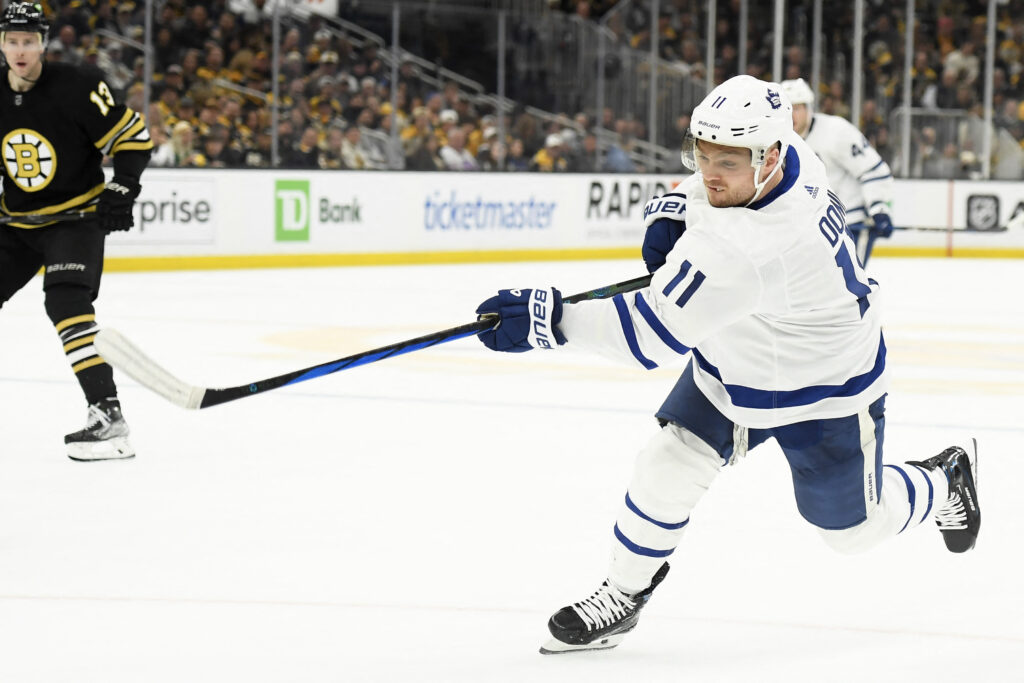
There weren’t many good, notable performances in this game for the Leafs, but I thought Connor Dewar deserves recognition as one of the few. He wasn’t implicated in the goal the fourth line gave up, and he played a direct role in the only goal that the Leafs scored. A shot from the point got knocked down in the slot and trickled toward the goalmouth, where Dewar was posting up next to Kevin Shattenkirk. Dewar snagged the puck and flipped a sweet backhand feed to David Kämpf, who had a mostly empty net to shoot into. Shots were 6-1 at 5v5 with Dewar on the ice, and the Leafs owned 80.45% of the expected goals. A very solid showing for one of the newest Leafs in his first playoff game with the club.
Beyond that, it’s pretty grim. Auston Matthews was fine to me. He couldn’t pull off that shot into the exposed cage with Swayman out, but it was an athletic, skilled play to create the chance in the first place. He should’ve been a little more aggressive in hunting his shot, and I would’ve liked to see them feature it more on the 4v3 PP. His offensive-zone penalty was also pretty careless. It was not Matthews’ best game, but I certainly noticed he was impacting the game.
That’s something I couldn’t say for Mitch Marner, who was largely invisible. Marner’s on-ice metrics were good, but the eye test was not kind. Marner, at his best, is the most visible player on the ice–electric on his edges, dancing around, probing the defense, and affecting play over all 200 feet. He didn’t have that same energy or pace to his game, was kept to the perimeter, and stopped/slowed up and retreated rather than playing a north-focused game. The theory of splitting Matthews/Marner on two separate lines is they are both good enough offensive players to drive their own scoring lines. The Leafs will need both 16 and 34 to be better in Game 2 to actualize that vision.
It didn’t help that the linemates of both Marner and Matthews had nights to forget. Matthews’ linemates, Max Domi and Tyler Bertuzzi, seemed to get suckered into the Bruins’ trap by both taking stupid penalties. Neither penalty had anything to do with the play, both were taken up the ice, and both got carried away in the moment. They were outplayed in the expected goal battle, and when you combine that with bad penalties that are exposing a weak Maple Leafs penalty kill, it’s not a pretty combo. Both need to be better in Game 2.
Marner’s most notable linemate, John Tavares, also had a night to forget. Tavares had looks around the net on the early second-period power play, but he couldn’t get his hand low enough on the stick to make good contact and deflect the passes into the net. It was disappointing knowing Tavares’ best skill at this point in his career is his ability to be rock-solid on his stick and finish in tight (Tavares did do a good job in the faceoff dot at least, his other elite skill). Perhaps the most notable moment for Tavares was a bizarre wind-up slap shot from far out on a solo rush when he had a path to the net.
The forward core players weren’t the only players who disappointed, though. I didn’t see much from Morgan Rielly — certainly not a game up to his usual playoff standard. We’ve come to expect Rielly to raise his game in the postseason — less porous defensively, more impactful offensively — but neither of those things really came to pass. The Leafs will need Playoff Rielly to show up in Boston on Monday night.
Jake McCabe isn’t as established as a playoff player, but he is the Leafs’ second-best defenseman. He didn’t start the series well, either. McCabe turned far too many pucks over and was caught in possession multiple times; he’d dilly-dally for a second or two, and by the time he made his decision, a Boston forechecker was right on him forcing a broken play. He’s got to adjust quickly to making faster decisions at the playoff-hockey pace.
All of Toronto’s best and most important players had nights to forget last night. That includes Ilya Samsonov, who I don’t think was awful, but he was certainly the worst goalie in the game and didn’t make a ton of big saves. Samsonov made one great save in the first period on a mad scramble in the crease, where he showed his flexibility to hold the far post and keep the game 1-0. Beyond that, Samsonov finished just 19/23 (.826), which is not a pretty stat line. You’d like him to find a way to come up with one of the second or third goals to keep the deficit manageable. Neither were ugly goals that he had to have, but at the end of the day, Jeremy Swayman was dialed in and making big saves at the other end.
Storylines for Game 2
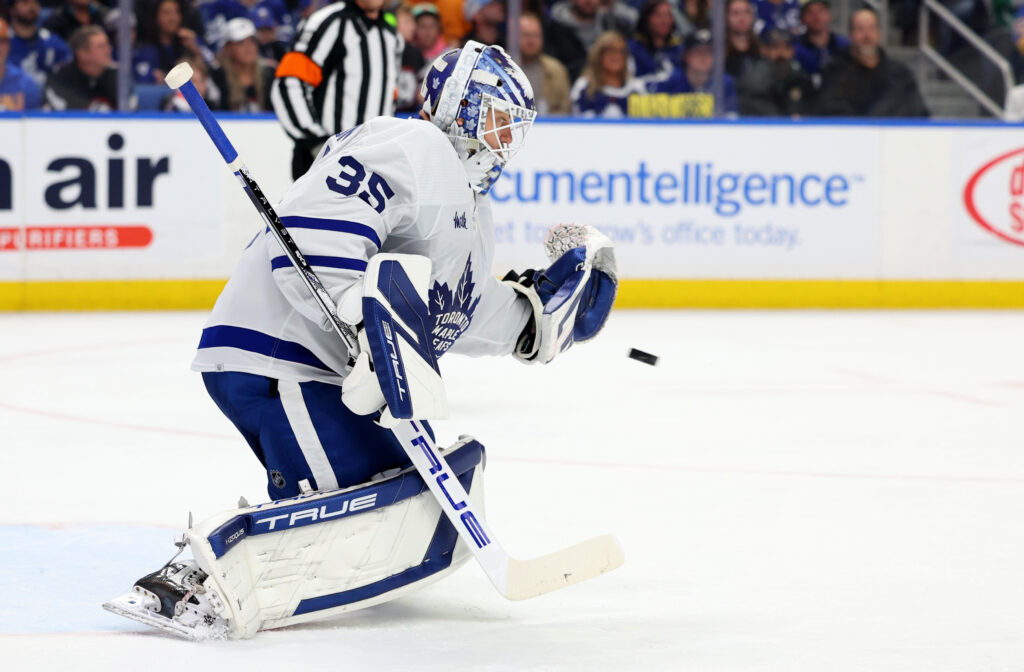
1.) What is William Nylander’s status?
This is far and away the biggest talking point after Game 1 and one I haven’t mentioned yet. The Leafs played Game 1 without William Nylander, who was mysteriously absent due to an undisclosed health problem that somehow was aggravated in the off-days since Wednesday. I have no idea what could be going on with Nylander, but it is a rough turn of events for the Toronto Maple Leafs. Needless to say, the Leafs are going to be in trouble against one of the NHL’s best goalie/defense tandems if they miss one of their three superstar-calibre forwards, a player who scored 40 goals and finished 10th in the NHL in points. He’s also critical to driving their power-play entries at 5v4, which were a problem on all but the 4v3 where there was extra ice to work with.
Any team would be in trouble in a playoff series losing a player of that calibre, but the Leafs are particularly vulnerable given their top-heavy salary structure and the manner in which they rely on their stars to produce offense. This was the pickle we saw play out in 2021 against Montreal when John Tavares was injured; deleting ~10% of your cap is problematic. Moreover, the theory of how the Leafs were going to be able to break through against Boston in this series was centered around their forward depth and the ability to put the stars on three different lines. Without Nylander, the Leafs’ third line looked toothless in Game 3 and allowed the Bruins to focus matchup attention more heavily on the top two lines. Toronto needs Nylander to play and be effective to turn this series around.
2.) Who is starting in goal… for both teams?
Both teams have questions about their net for Game 2 but for different reasons. On the Leafs’ side of things, there’s the iffy effort of Ilya Samsonov. I would assume that they stick with their designated starter; it’s pretty aggressive to make a change after only one game, although Samsonov has now gone a little while since his last “good” start.
Over his last three starts, Samsonov has saved just 60 of the 75 shots he faced for an .800 SV%. His last quality start will have been two weeks to the day of Game 2. My guess is the Leafs will stick with Samsonov, giving him one more chance with Joseph Woll in their back pocket as a “change-up” option for Game 3 if they find themselves down 2-0. Give the kid a chance with the home crowd behind him rather than throwing him into the fire in Boston.
Boston’s predicament is that they have alternated goalies nearly the entire season. Linus Ullmark and Swayman got a nearly even distribution of games, and the team bounced between the two without fail this entire season. It’s been the key to their team’s success and the squad’s elite team SV%. Traditional logic says that in the playoffs, you pick one guy and ride with him, but the flip side of the argument goes, “Why change what has worked for you this entire season?”
Last playoffs, we saw Boston act like a traditional team, tabbing Ullmark as their guy even though he was injured, which eventually went poorly. They then panicked and put Swayman in for Game 7. Rather than dealing with the goalie circus, will they stick to the formula they’ve used all year? If they flip goalies and the Leafs can get one or two past him early, it doesn’t take much to turn this two-headed monster into a bit of a sideshow distraction for Jim Montgomery.
3.) Discipline and toughness
This felt like yet another playoff game where the Maple Leafs approached the contest feeling like they needed to prove their toughness rather than just playing tough and effective. Reaves’ miscue on the first goal hunting the hit was somewhat similar to Kyle Clifford’s five-minute major in Game 1 of the 2022 series against Tampa, and then we had the parade of stupid penalties by Domi, Bertuzzi, and Matthews. Maybe the Leafs got a tough whistle in Game 1, but they were also the less intelligent team, playing a sloppy, undisciplined game where they seemed to get in their own heads.
We’ve seen this script before. The “Leafs are soft” narrative is so deeply embedded into the team psyche at this point that Game 1 saw them go too far out of their way to prove a point. They need to be competitive and physical in a more focused and disciplined way in Game 2.
4.) The special teams conundrum
The Leafs lost this game in part because they were much worse on special teams. This was also the case in the regular-season series between Toronto and Boston. It’s very hard for a team to win a playoff series when at a disadvantage in net and on special teams, as the Leafs found out all regular season against the Bruins. I’m not sure what the Leafs can do to fix the goaltending dimension other than hope Samsonov and/or Woll play better and their forwards finish more chances. The special teams angle is one they have to work to address.
The Leafs didn’t get a ton of power-play time in Game 1, but it wasn’t inspiring when they did. They couldn’t score on their 4v3 when they desperately needed to, and a later 5v4 power play was embarrassing; the Leafs were unable to gain the zone at all. The penalty kill was even worse, a continuation of all their persistent issues shorthanded. They allowed Boston to score on two of their five power plays; on two more, the Bruins hit the post at least once.
The Leafs could not disrupt puck movement and were exposed down low, with too much room for goal-line plays (like the fourth goal). They can’t seem to find the balance between aggressiveness and maintaining their structure at the moment. This has to be turned around ASAP. The DeBrusk goal, in particular, was way too easy.
5.) The stars have to come to play
This is what it really comes down to. The Toronto Maple Leafs are a good team because their star players are exceptional players. That’s been the case for ages, but the problem, as we all know, is the stars haven’t burned as brightly in the playoffs. Game 1 of the Tampa series was one of the more lackluster playoff games of the Matthews/Marner era. The group came out in Game 2 with their hair on fire, and the stars powered the squad to a decisive win that evened the series. They need that sort of energy and statement game tomorrow night.










